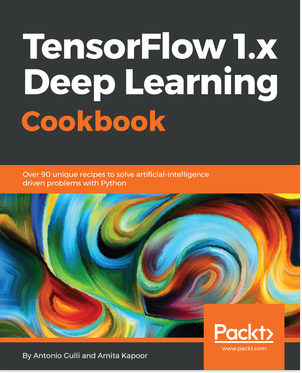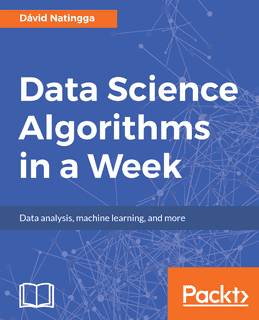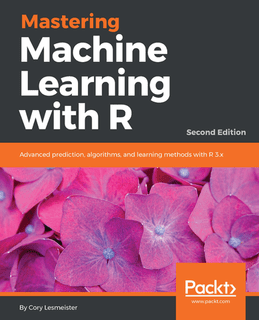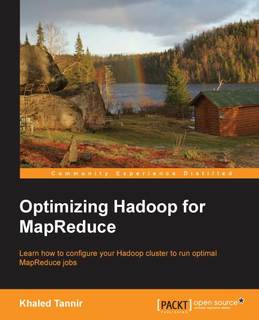TensorFlow 1.x Deep Learning Cookbook
By Antonio Gulli, Amita Kapoor
Take the next step in implementing various common and not-so-common neural networks with Tensorflow 1.x
In this book, you will learn how to efficiently use TensorFlow, Google’s open source framework for deep learning. You will implement different deep learning networks such as Convolutional Neural Networks (CNNs), Recurrent Neural Networks (RNNs), Deep Q-learning Networks (DQNs), and Generative Adversarial Networks (GANs) with easy to follow independent recipes. You will learn how to make Keras as backend with TensorFlow.
With a problem-solution approach, you will understand how to implement different deep neural architectures to carry out complex tasks at work. You will learn the performance of different DNNs on some popularly used data sets such as MNIST, CIFAR-10, Youtube8m, and more. You will not only learn about the different mobile and embedded platforms supported by TensorFlow but also how to set up cloud platforms for deep learning applications. Get a sneak peek of TPU architecture and how they will affect DNN future.
By using crisp, no-nonsense recipes, you will become an expert in implementing deep learning techniques in growing real-world applications and research areas such as reinforcement learning, GANs, autoencoders and more.
What you will learn:
- Install TensorFlow and use it for CPU and GPU operations
- Implement DNNs and apply them to solve different AI-driven problems.
- Leverage different data sets such as MNIST, CIFAR-10, and Youtube8m with TensorFlow and learn how to access and use them in your code.
- Use TensorBoard to understand neural network architectures, optimize the learning process, and peek inside the neural network black box.
- Use different regression techniques for prediction and classification problems
- Build single and multilayer perceptrons in TensorFlow
- Implement CNN and RNN in TensorFlow, and use it to solve real-world use cases.
- Learn how restricted Boltzmann Machines can be used to recommend movies.
- Understand the implementation of Autoencoders and deep belief networks, and use them for emotion detection.
- Master the different reinforcement learning methods to implement game playing agents.
- GANs and their implementation using TensorFlow.
Click here to get the free eBook
Data Science Algorithms in a Week
By Dávid Natingga
Build strong foundation of machine learning algorithms In 7 days.
This book will address the problems related to accurate and efficient data classification and prediction. Over the course of 7 days, you will be introduced to seven algorithms, along with exercises that will help you learn different aspects of machine learning. You will see how to pre-cluster your data to optimize and classify it for large datasets. You will then find out how to predict data based on the existing trends in your datasets.
This book covers algorithms such as: k-Nearest Neighbors, Naive Bayes, Decision Trees, Random Forest, k-Means, Regression, and Time-series. On completion of the book, you will understand which machine learning algorithm to pick for clustering, classification, or regression and which is best suited for your problem.
What you will learn:
- Find out how to classify using Naive Bayes, Decision Trees, and Random Forest to achieve accuracy to solve complex problems
- Identify a data science problem correctly and devise an appropriate prediction solution using Regression and Time-series
- See how to cluster data using the k-Means algorithm
- Get to know how to implement the algorithms efficiently in the Python and R languages
Click here to get the free eBook
Mastering Machine Learning with R – Second Edition
By Cory Lesmeister
Master machine learning techniques with R to deliver insights in complex projects
In this book, you will explore, in depth, topics such as data mining, classification, clustering, regression, predictive modeling, anomaly detection, boosted trees with XGBOOST, and more. More than just knowing the outcome, you’ll understand how these concepts work and what they do.
With a slow learning curve on topics such as neural networks, you will explore deep learning, and more. By the end of this book, you will be able to perform machine learning with R in the cloud using AWS in various scenarios with different datasets.
What you will learn:
- Gain deep insights into the application of machine learning tools in the industry
- Manipulate data in R efficiently to prepare it for analysis
- Master the skill of recognizing techniques for effective visualization of data
- Understand why and how to create test and training data sets for analysis
- Master fundamental learning methods such as linear and logistic regression
- Comprehend advanced learning methods such as support vector machines
- Learn how to use R in a cloud service such as Amazon
Click here to get the free eBook
Optimizing Hadoop for MapReduce
By Khaled Tannir
This book is the perfect introduction to sophisticated concepts in MapReduce and will ensure you have the knowledge to optimize job performance. This is not an academic treatise; it’s an example-driven tutorial for the real world.
Starting with how MapReduce works and the factors that affect MapReduce performance, you will be given an overview of Hadoop metrics and several performance monitoring tools. Further on, you will explore performance counters that help you identify resource bottlenecks, check cluster health, and size your Hadoop cluster. You will also learn about optimizing map and reduce tasks by using Combiners and compression.
The book ends with best practices and recommendations on how to use your Hadoop cluster optimally.
What you will learn:
- Learn about the factors that affect MapReduce performance
- Utilize the Hadoop MapReduce performance counters to identify resource bottlenecks
- Size your Hadoop cluster’s nodes
- Set the number of mappers and reducers correctly
- Optimize mapper and reducer task throughput and code size using compression and Combiners
- Understand the various tuning properties and best practices to optimize clusters
Click here to get the free eBook.




